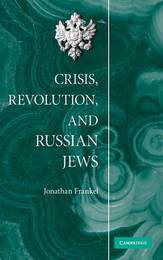
|
Crisis, Revolution, and Russian Jews
Hardback
Main Details
| Title |
Crisis, Revolution, and Russian Jews
|
| Authors and Contributors |
By (author) Jonathan Frankel
|
| Physical Properties |
| Format:Hardback | | Pages:336 | | Dimensions(mm): Height 235,Width 160 |
|
| Category/Genre | World history - from c 1900 to now |
|---|
| ISBN/Barcode |
9780521513647
|
| Classifications | Dewey:305.8924047 |
|---|
| Audience | | Tertiary Education (US: College) | |
|---|
|
Publishing Details |
| Publisher |
Cambridge University Press
|
| Imprint |
Cambridge University Press
|
| Publication Date |
15 December 2008 |
| Publication Country |
United Kingdom
|
Description
This collection of essays examines the politicization and the politics of the Jewish people in the Russian empire during the late tsarist period. The focal point is the Russian revolution of 1905, when the political mobilization of the Jewish youth took on massive proportions, producing a cohort of radicalized activists - committed to socialism, nationalism, or both - who would exert an extraordinary influence on Jewish history in the twentieth-century in Eastern Europe, the United States, and Palestine. Frankel describes the dynamics of 1905 and the leading role of the intelligentsia as revolutionaries, ideologues, and observers. But, elsewhere, he also looks backwards to the emergent stage of modern Jewish politics in both Russia and the West and forward to the part played by the veterans of 1905 in Palestine and the United States.
Author Biography
Jonathan Frankel is Saveli and Tamara Grinberg Professor of Russian Studies and Professor of Modern Jewish History, both emeritus, at the Hebrew University of Jerusalem. He has published many scholarly articles and authored or edited fifteen books, including Prophecy and Politics: Socialism, Nationalism and the Russian Jews, 1862-1917 (1981) and the Damascus Affair: 'Ritual Murder', Politics and the Jews in 1840 (1997).
Reviews"The essays in this collection constitute a fitting overview of Frankel's great strengths as a scholar, highlighting his versatility and ability to integrate his vast knowledge of Russian, European, and Jewish history into larger contexts. His syntheses of these questions provide us with an opportunity to look at historical questions in innovative ways. Reading this book reminds us why he will be so sorely missed." -Alexandra Korros, H-Judaic "The wonderful sociocultural sensibility that this historian of Jewish high politics displayed in that book is on display in Crisis, Revolution, and Russian Jews as well." -Kenneth B. Moss, The Journal of Modern History
|